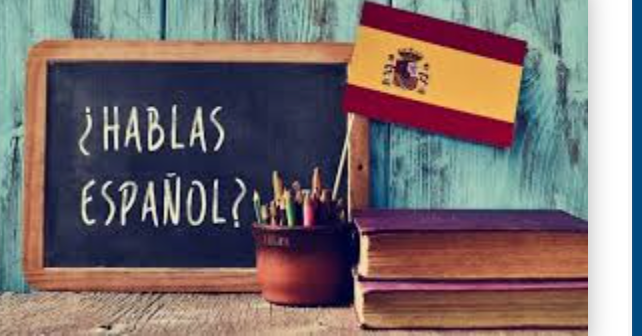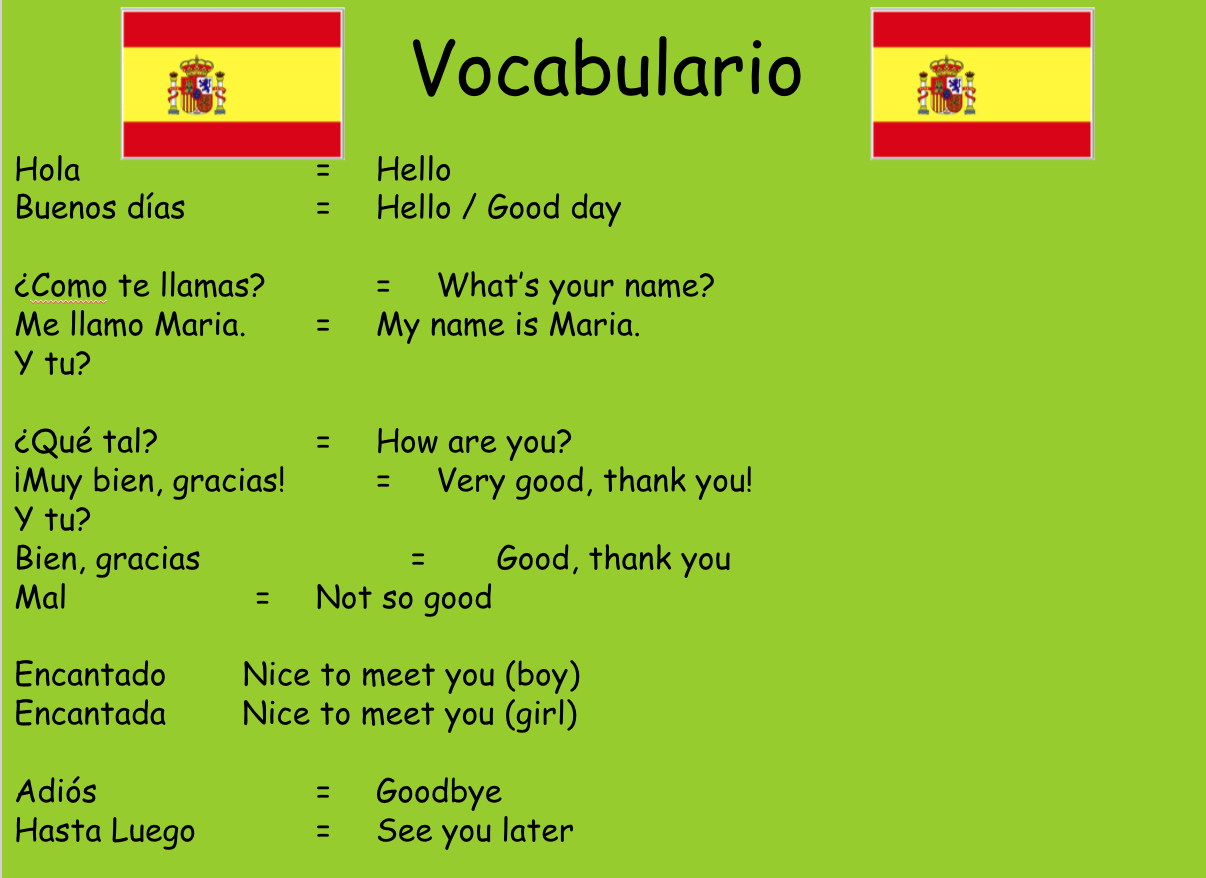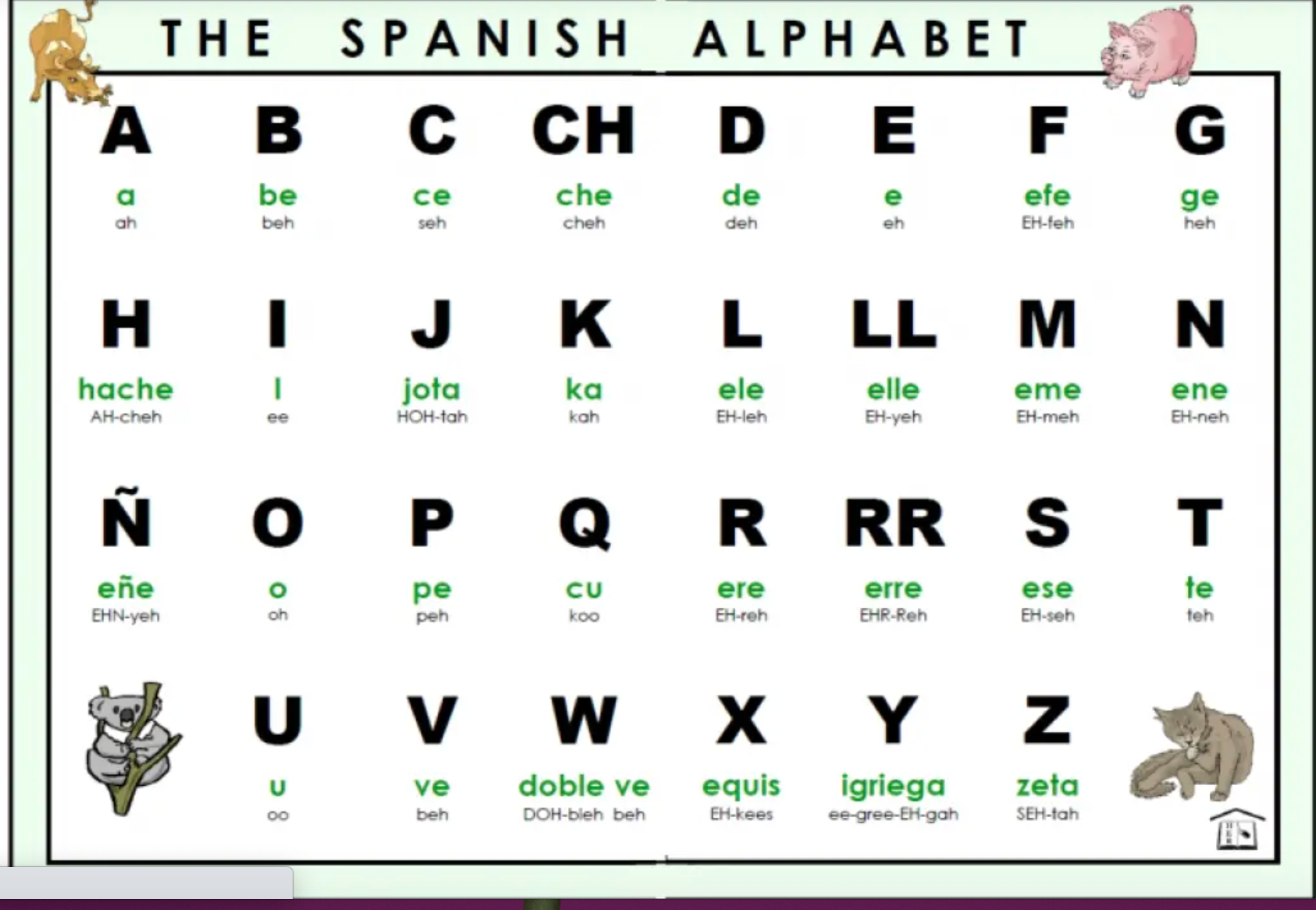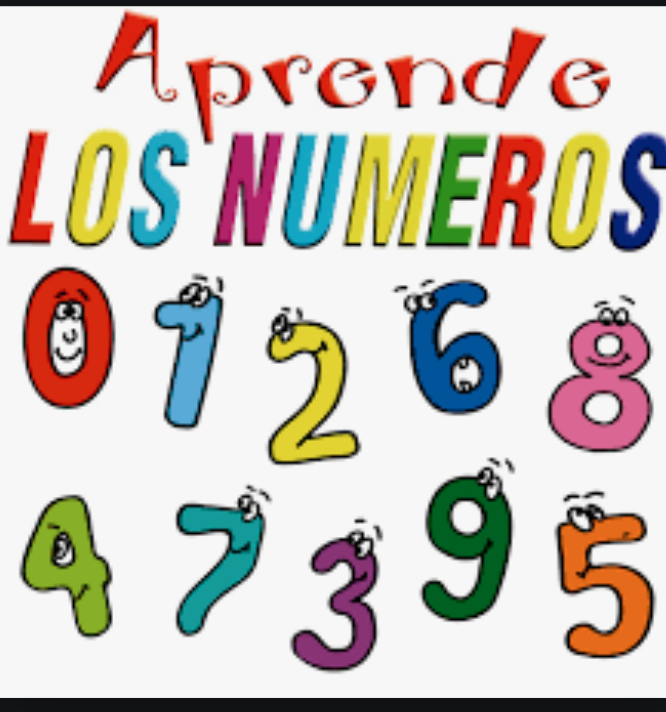7 Spanish
Section outline
-
Bienvenidos a la clase de Español

During this class, we will talk about What Spanish is all about.In our first class, I will introduce myself to the class and we will look at what Spanish is all about.
Also in today's class also we will learn and practice how to greet and farewell people.
Big Idea: Introduction
Learning Intentions: We are learning to (WALT)...
- Outline the expectation for Spanish
- Provide an opportunity to Ms Martin to know how much Spanish the students know.
- Show the students typical things of Spain
- Recognise and respond to greetings
- Greet and farewell people
AO Coverage:
Selecting and using language, symbols, and texts to communicate
Recognise that the target language is organised in particular ways.
Recognise that the target culture(s) is (are) organised in particular ways.
Success Criteria: I can/have...
- I understand the course outline for Spanish 2021
- Completed the activity how to great people
Activities:
Do you know any Spanish already? With your group brainstorm all the Spanish you can think of meanings/movies/restaurant/food/celebrities
Make this in an A3 colour paper, DON'T USE INTERNET PLEASE FOR THIS ACTIVITY
What do you hope to learn this year?
EXPLORE / TŪHURA learning intentions:
- We are EXPLORING what is Spanish all about
- We are EXPLORING to recognize and respond to greetings
- We are EXPLORING to greet and farewell people
-
This week.....
- Greetings

Also in today's class also we will learn and practice how to greet and farewell people.
Big Idea: who are you?
Learning Intentions: We are learning to (WALT)...
- Recognise and respond to greetings
- Greet and farewell people
- Say your name
- To be able to greet someone in Spanish
- to ask how someone understands their response.
AO Coverage:
Selecting and using language, symbols, and texts to communicate
Recognise that the target language is organised in particular ways.
Recognise that the target culture(s) is (are) organised in particular ways.
- Completed the activity how to great people
Activities:
1. Roleplay
2. Quiz
3. Unscrambled
EXPLORE / TŪHURA learning intentions:
- We are EXPLORING what is Spanish all about
- We are EXPLORING to recognize and respond to greetings
- We are EXPLORING to greet and farewell people
FOCUS / ARONGA learning intentions:
- We are FOCUSING on learning a basic introduction in Spanish
- We are FOCUSING on pronouncing the greetings correctly
- We are FOCUSING on culturally aware of how to greet in Spanish
-

PLAN & DO / WHAKAMAHI learning intentions:
- We are PLANNING to do a Spanish roleplay so that we can experiment a real dialogue with a Spanish person
-
Hola, Buenos Dias Y7 Spanish!
Learning Intention:
We are learning to learn the Spanish alphabet
Success Criteria:
Recognise and respond to greetings Identify and respond to letters of the alphabet
Identified the sounds of the Spanish alphabet with the letters
Spelled correctly Spanish words Created my own Spanish alphabet EL ALFABETO

Hola chicos y chicas, in today's class, will continue with the Spanish Alphabet and we will reinforce the Spanish sounds and how well you identified the sound with the letter. Also, you will create your own Spanish alphabet.
Remeber to use these websites for you to practise at home:
http://www.spanishspanish.com/alfabeto_ipower.html
Don Quijote website (www.donquijote.org/spanishlanguage/alphabet) and learn vocabulary list
Activities:
- Answer the roll in Spanish
- Practice the sounds of the alphabet
- Competition game with the whiteboards
- Create your own alphabet
EXPLORE / TŪHURA learning intentions:
- We are EXPLORING what is Spanish all about
- We are EXPLORING to recognize and respond to greetings
- We are EXPLORING to greet and farewell people
- We are EXPLORING the sounds of the Spanish alphabet
- We are EXPLORING identify the sounds with the letters of the Spanish alphabet
- We are EXPLORING to spell correctly in Spanish
-
Distance Learning unfortunately for us this week. Please follow the system in place for each whanau. I will be posting the resources in your whanau google classrooms.
For this week we will do an Education Perfect Task-Spanish Introducctions
EXPLORE / TŪHURA learning intentions:
- We are EXPLORING what is Spanish all about
- We are EXPLORING to recognize and respond to greetings
- We are EXPLORING to greet and farewell people
- We are EXPLORING the sounds of the Spanish alphabet
- We are EXPLORING identify the sounds with the letters of the Spanish alphabet
- We are EXPLORING to spell correctly in Spanish
- We are EXPLORING Confidently greet people and ask how they are
- WE are EXPLORING Count from 0-100
-
LOS NUMEROS 0-100

ACTIVITY
Hand writing in your Spanish books 0-100 (see your whanau google classroom)
-
This week we will build our understanding about the celebration El dia de los muertos, and we will focus to distinguish, compare and contrast between Día de los Muertos and Halloween.
Learning Intention:
We are learning to understand of the Mexican celebration of Día de los Muertos.
Success Criteria:
develop an overall understanding of the Mexican holiday, Día de los Muertos, including the history, origins, and significance of this celebration to people of Mexican origin recognize common traditions and activities associated with Día de los Muertos develop an open-mind and respectful attitude towards diverse ethnic groups learn about cultural diversity and multiculturalism in a positive way Activities:
- Comparison with Halloween
- Caption for the images
-
Mi calavera literaria
Learning Intention:
We are writing a poem inspired by the Mexican tradition of literary calaveras shared around Day of the Dead
Success Criteria:
Explore some of the symbolic elements of Day of the Dead by focusing on cultural practices and a specific type of poem.
Focus on content and structure elements of a calavera poem and its symbolism.
Develop communicative abilities by planning and writing your own calavera poem for another person.
Learn and reflect about cultural diversity and multiculturalism in a positive, creative way
Activities:
1. Listening to account of someone living in Mexico
2. Interacting and interviewing.
2. Reading along a calavera dedicated to the teacher
3. Using a writing frame to explore creating our own calaveras.
-
Day of the Dead in movies
This week we are expanding on our knowledge of Day of the Dead and looking at how it is represented in two well-known movies. We will look at cultural references and develop our ability to read in Spanish when there is a lot of new language by using our prior experience and knowledge.
Learning Intention:
We are exploring representation of Mexican culture and traditions in two movies to develop our reading and listening abilities.
Success Criteria:
Explore culture through movies based on the topic. Explore readings with unknown language by drawing from prior knowledge. understand gist and detail.
Focus on and recognize cognates and other words that are similar in Spanish and other languages we know.
Develop inferring abilities to draw meaning of a new language from context clues, situational clues, and prior knowledge. Draw conclusions after reading and listening.
Reflect on how Mexican culture is represented in movies and about the real cultural references. Share your ideas in a short review in Spanish.
Activities:
1. Summarise plot and comment on two known movies based on Day of the Dead (watch them independently if needed).2. Identify basic characters, similarities and differences.
3. Play two interactive games to compare real life Mexico and symbols to what is used for the movies.
4. Reading about a character to focus on gist and detail.
5. Writing a short review in Spanish using sentence frames.
-
Greetings and Farewells in Spanish
This week we are revising and consolidating greetings and farewell phrases you may have learned independently at home and heard before.
Learning Intention:
We are learning and consolidating basic greetings and farewell phrases you need when you meet someone.
Success Criteria:
Notice and explore basic phrases and questions used when meeting people in Spanish.
Focus on and become aware of how common expressions are used in a real-life context.
Develop inferring abilities to draw meaning of a new language from context clues, situational clues, and prior knowledge. Draw conclusions after reading and listening.
Reflect on how people relate when they meet in Spanish and what sort of behaviour may be considered socially acceptable.
Activities:
1. Engage with a class poll about ice creams.2. Join an interactive game (Quizizz) to learn and revise greetings and farewells.
3. Use a vocabulary builder (Quizlet) independently.
-
Using have, want, live, am.
This week we are learning four powerful action words to talk about ourselves: I want, I have, I live, I am. We will recycle greetings and practice reading strategies too.
Learning Intention:
Learning four verbal chunks to use when talking about ourselves after reading for gist and detail.
Success Criteria:
Notice and explore known phrases and questions used when meeting people in Spanish.
Notice cognates and other textual clues.
Explore reading in Spanish to find specific information.
Focus on grammar and how four verbs are conjugated for you and I.
Develop inferring abilities to draw meaning of a new language from context clues, situational clues, and prior knowledge.
Draw conclusions about the system of the language.
Reflect on how people relate when they meet in Spanish and what sort of behaviour may be considered socially acceptable.
Activities:
1. Engage with a class poll about animals
2. Do an interactive reading activity.
3. Use an Action Diamond to learn and practice verbs.
4. Make an audio/video recording about ourselves.
-
Week 7
This week we are learning about Christmas and New Year’s traditions from Hispanic countries.
Learning Intention:
To explore culture and reflect on our own traditions and celebrations by looking at some common elements of Christmas and New Year’s in the Hispanic world.
Success Criteria:
Explore other ways to celebrate the end of the year and Christmas.
Focus on when people celebrate, what they eat, do, and hope for.
Develop understanding of other ways of life by discussing some elements we are familiar with and others that are peculiar or funny,
Reflect on our own celebrations, their relevance in our lives, and where they come from.
Activities:
1. Answer questions about our own habits.
2. Watch videos
3. Guess traditions
4. Share our own.
